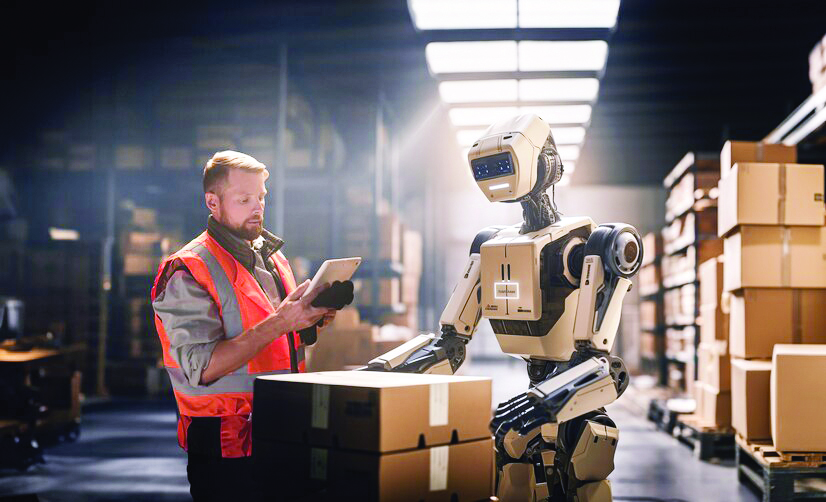Artificial Intelligence:The Driving Force in Logistics
The integration of AI in logistics not only enhances efficiency but also helps meet sustainability goals and saves costs

Do you know Amazon robots can lift up to 1,250 pounds? With over 750,000 of these mobile robots in action, they’re equipped with tiny cameras to identify people, pods, and other robots. These cameras, both front and underneath, also scan QR codes on the floor for precise navigation, preventing collisions in the fulfillment center. Their main job is to help Amazon workers by fetching shelves of products. Once found, the robots bring them to employees who pack items for customer orders. This speeds up deliveries and makes inventory checks faster.
In recent years, the logistics industry has experienced a major shift, driven by the booming growth of ecommerce since the 2000s. This transformation is accelerating even further thanks to rapid advancements in Artificial Intelligence (AI). These technological breakthroughs are reshaping the landscape of logistics and transportation, ushering in a new era of efficiency and innovation. From route optimisation, inventory management, workforce management, reduction of operational costs, sustainability, efficient use of space to vehicle tracking and safety, AI is streamlining logistics and transportation. According to a McKinsey report, AI will create an entirely new “logistics paradigm” by 2030.
“In today’s logistics and transportation landscape, the integration of AI, ML, IoT, RFID, and other advanced technologies is revolutionising supply chain management. These technologies are not just enhancing existing processes; they are fundamentally reshaping the way goods move from source to destination. AI and ML play a crucial role in optimising transportation routes, automating warehouse operations, and improving demand forecasting. They enable smart decision-making, leading to cost savings, improved efficiency, and safer working conditions. For instance, AI-powered tools can automate repetitive tasks, such as inventory management, and improve predictive accuracy over time, adapting to changing market conditions,” said Eugene Panfilov, General Manager, Borzo India and Brazil.
In 2024, warehouse tech is on the rise, changing how we handle goods. Intelligent machines, guided by smart algorithms and AI, are taking over transportation. Thanks to advancements in tech like AI, sensors, and computing power, we’re seeing the boom of autonomous vehicles. These vehicles aren’t just about efficiency. They’re a game-changer for cutting costs in transportation and logistics. By ditching human drivers, companies can save big on labour costs for wages, benefits, and rest periods.
In the future, AI and ML will be big players in warehouses. They can process lots of data quickly, giving real-time info on inventory, demand, and the best layouts. With AI, decisions like when to restock and the best routes for picking orders can be automated. This not only makes things run smoother but also saves costs. Did you know Zebra Technologies automation systems have reduced the time workers walk to complete a task by 40 percent?
“Automation in logistics helps optimise vehicle trips, labour usage, inventory levels, warehousing, and supplier management. This will in turn, reduce wastage, drive efficiencies and support sustainability in logistics. In the long run, businesses can increase revenue at lower operating costs, enhance customer service and achieve their sustainability goals,” mentioned TCS in its research on AI in logistics.
Thanks to technology, real-time tracking has made things easier in transportation. AI-powered systems track where goods are, thus making the supply chain work better.
AI is like a super inspector in warehouses, checking goods for defects using smart visual inspections. It ensures only top-quality products go to customers by analysing images and catching any issues.
“AI will also be used to make decisions. Companies will use AI technology and software for data analytics and determine the best way to ship their products without human intervention. For example, if there is a shortage of trucks on a certain day due to inclement weather, then AI can determine which products need to be shipped first so that customers are not left waiting for their orders,” mentioned Flowspace, an ecommerce logistics and fulfillment company.
According to Euronews, a Norwegian start-up called Aviant has expanded its drone delivery service. These drones can handle harsh winter conditions and deliver up to 1.5kg of goods like medicine, groceries, and meals from local restaurants. Drones are becoming useful for businesses to reach places where ground transport is difficult or not sustainable.
AI is changing how back office work is done by automating tasks like scheduling and tracking. In logistics, chatbots are a game-changer for customer service, handling things like delivery requests, order changes, shipment tracking, and FAQs. It makes work smoother and improves customer service.
“Routine and repetitive tasks such as route planning, vehicle maintenance scheduling, and even autonomous driving in some cases, could see automation through AI technologies. This could impact jobs related to manual data entry, basic route navigation, and certain administrative roles. However, it’s crucial to note that AI can also create new opportunities for skilled workers in areas like AI system development, maintenance, and oversight. On the cost front, AI holds the ‘promise’ of significant savings for businesses in this sector. Automated route optimisation, real-time tracking, and predictive maintenance can lead to more efficient resource utilisation, fuel savings, and reduced operational downtime. The cost reduction percentage will vary based on the extent of AI implementation and the specific processes involved, but studies suggest potential savings can be in the range of 10% to 30% in logistics operations. It will take some years till we see the ‘cost-savings’ potential of AI,” said Panfilov of Borzo, a global on-demand delivery service firm.



